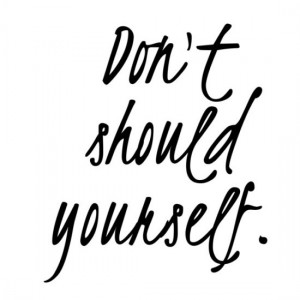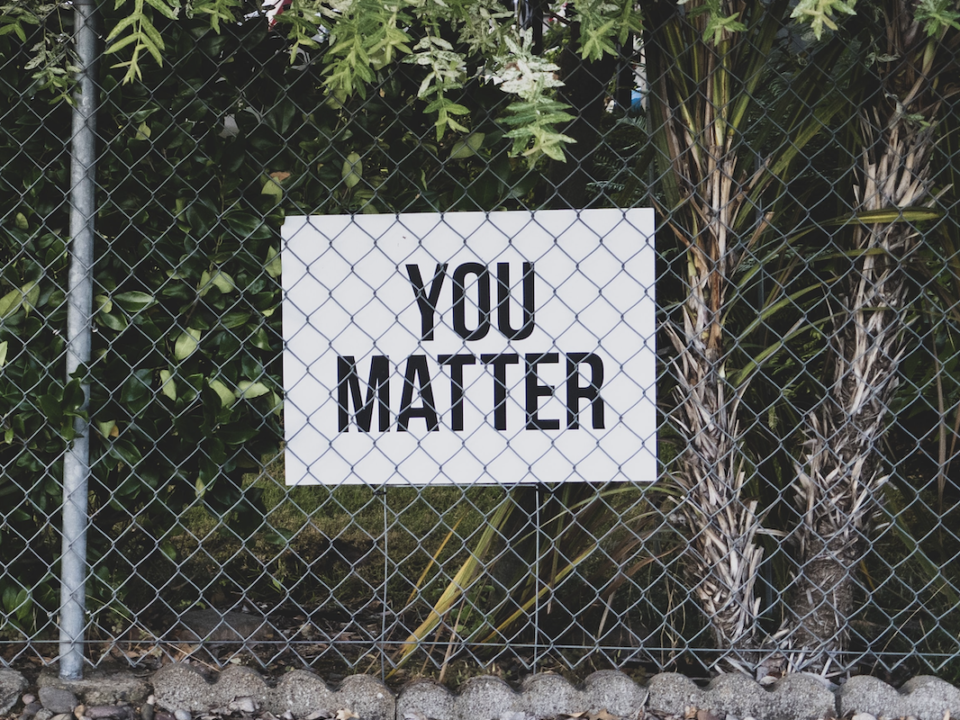Deleting “Shoulds” from Your Grief Vocabulary
One of the most problematic phrases in our culture’s grief vocabulary are the words, “You shouldn’t be … (fill in the blank with whatever makes them uncomfortable).” In general, our human nature is uneasy around sadness or any deep emotional pain that cannot be comforted. We fight to control or avoid grief in ourselves or others at all costs. We pick up this message subconsciously from the media, movies and even TV shows that don’t generally make time to illustrate grief but push on to the next shocking plot-twist or scandal and meticulously edit out the pain.
The worst though, is when we hear this message directly from someone who is seemingly caring for us but, very clearly, doesn’t know what they’re talking about. I’ve heard so many stories of family and friends, sometimes even strangers saying things like,
“You should be over this by now,”
“You should move on,”
“You should have another kid,”
“You should think about dating,”
“You should celebrate their life, not cry about it.”
What do these “shoulds” do to us? It seems to me that they take. And, sadly, they are trying take away from someone who has already had something special taken from them.
“Shoulds” are an attempt to take away permission to feel whatever emotions accompany your grief. Because our culture struggles to look pain in the face and enjoys believing that positive thinking can fix anything, it’s little surprise that others attempt to manage or fix our feelings with “shoulds”.
What is the first emotion you associate with grief? Perhaps you thought of sadness. Sadness is a profound emotion in grief but grief is a whole spectrum of emotions that seems to vary just as widely as the scope of human relationships. Some of the most prominent emotions in grief include (but are not limited to): sorrow, anger, guilt, fear and loneliness. We can feel all of these at the same time, one for a long time and others for a short time, or any combination imaginable. But the point is, none of us really know how grief is going to feel or go on feeling because it will probably be all over the board and, over time, it will change.
Unfortunately, because our society doesn’t like or understand grief it is always trying to find ways to minimize the pain experience. This happens to such an extent that the bereaved can sometimes feel guilty for “still” being sad. With these pressures, it becomes very easy for the grieving person to begin believing that what they feel as a result of grief is wrong. I shouldn’t be feeling like this. And the internal struggle with “shoulds” begins.
I should be over it, back to normal …
or,
I shouldn’t be crying anymore, missing them, feeling like this.
On Tuesday evening we held our Annual Candlelight Service of Remembrance. This year we honored 78 unique and wonderful people. We watch a photo tribute, have a reading of the names, a time of encouragement, and (perhaps most significantly) a time of acknowledgment of their pain.
Acknowledgment, noun:
1. an act of acknowledging.
2. recognition of the existence or truth of something:
3. an expression of appreciation.
4. a thing done or given in appreciation or gratitude.
Did you notice the word “given”? Acknowledgment gives what “shoulds” take. Acknowledgment offers acceptance, compassion, and understanding to grieving people who are experiencing loneliness, isolation and rejection. Acknowledgment validates instead of denies, it opens instead of closes.
The poem below is from our Remembrance Service and is a beautiful example of what acknowledgment looks like.
This poem was read as five candles were lit at our Candlelight Service:
We light One for our Grief,
One for our Courage,
One for our Memories,
One for our Love.
and One for our Hope.
This candle represents our Grief
The Pain of losing you is intense. It reminds us of the depth of our love for you.
This candle represents our Courage
To confront our sorrow, to comfort each other, and to change our lives.
This candle is in your Memory
The times we laughed the times we cried, the silly things you did, and the caring and joy you gave to us.
This candle is the light of Love
As we enter this holiday season, day-by-day we cherish the special place in our hearts that will always be reserved for you. We thank you for the gift your loving brought to us.
And this candle is the light of Hope
It reminds us of love and memories of you that are ours forever. May the glow of the flame be our source of hopefulness now and forever.
We will always love you.





9 Comments
Hi Molly,
This is one of my favorite blogs of yours! It is so true that we don’t “should” ourselves and we don’t “should” others. Everyone’s grief is his or her own and we all grieve in different ways. It makes me think about the the “H’s” we talk about – Hang around, Hug, and Hush. We acknowledge the pain and grief but we don’t try to take it away.
Thank you for always giving us something to ponder. I enjoy reading your blog each week!
Becky
Molly –
Should, could and would are all classic words of waste at times. I love the fact that you are educating us & our community about the practical & thoughtful ways to think through our word choices. At times we all lack common sense, that seems to be more true when it comes to death and our society. I appreciate you and the great blogs you share with us.
Great work, keep them coming Molly!
Shoulda, woulda, coulda, all are things that we dwell on in hindsight. We should try to not let those things discourage us or get us down. Keep looking forward, treating each other with compassion. After all we all in this thing called life,together. Thank you Molly for your thought provoking insights.
I think that the people who say the shoulds either haven’t experienced grief yet, or not in awhile, and probably not the same way you are. It’s detrimental, but in my experience I just forgive because they are only trying to help. Six months after my grandma died, who was the closest person to me until then, someone told me I should be over it by now. That hurt a lot, but not knowing much about grief I felt abnormal like I must have a problem because I haven’t healed yet. I think a lot of people probably feel alone in their grief and like they must be abnormal to not be done with it yet, which is what made the Rememberance service so powerful…the way we read off the names and so many people were there each remembering someone and going through grief made it more obvious that we are not alone.
Molly, this is a great reminder that we can’t let people or ourselves “should” on us during grief. I love how bold this piece is, how blunt yet supportive as well. I must agree with Shasta, the ones who “should” on others haven’t yet walked that mile. I love Shasta’s perspective & how she forgave them. She is a sweet spirit who has more experience in this area than most people more than twice her age, and she is wise beyond her years. Thank you, Molly! Carrie